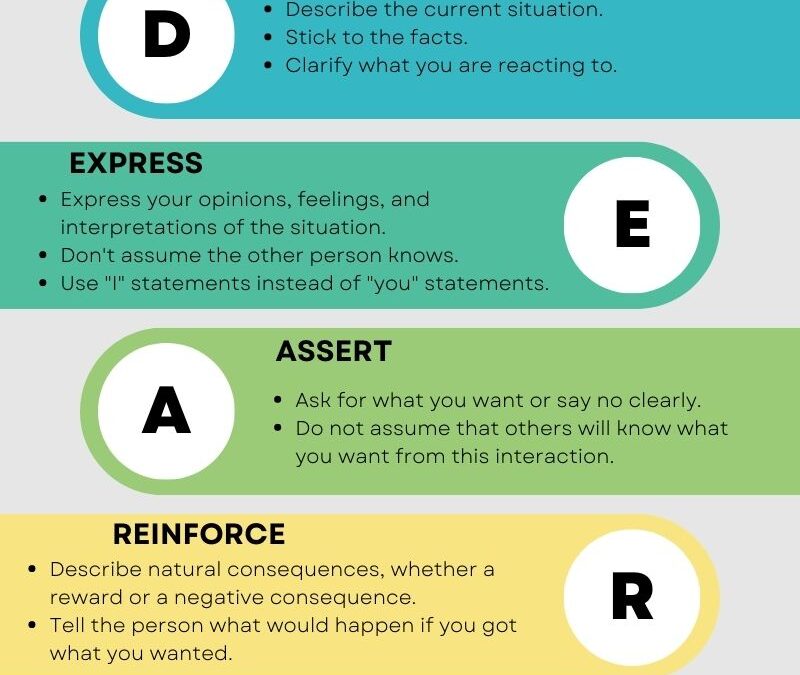Communication is important. Especially during the holidays when you may attend events, spend time with your in-laws, or visit your hometown. Many assume that others may understand what they mean without much clarification or that they have the same assumptions, values, and objectives. People are vastly different, so to understand and to be understood, we must communicate clearly. One easy way to do that is to use the DEARMAN template. It’s a concept developed by Marsha Linehan in her Dialectical Behavioral Therapy Manual. To use this template effectively, you must take some time to clarify your goals for the interaction, considering how this interaction will affect this relationship and how this interaction will affect your self-respect.
DEARMAN
DEARMAN is an acronym, with each corresponding letter as a step in a communication sequence. An example we can use is the common experience of family members offering unwanted comments during the holidays. D stands for Describing the situation, making sure that this initial section is fact-based. For example, “Uncle, I see you once a year, and you often give me advice that I did not ask for at these dinners.” This section can be tricky because it is easy to add interpretations, judgments, and opinions here when there is an intensity of emotion behind what is being said. That can be addressed in the next section.

E in the DEARMAN template stands for Express
This is when you can express your interpretation, feelings, and opinions about the situation. “When you do this, I feel unheard and disconnected from you. It also makes me feel frustrated, as I begin to wonder if you are judging my life choices.” It is important not to use blaming statements that may include “you should” or “you shouldn’t.” You are more likely to get your point across without defensiveness from your audience if you use “I” statements to discuss your experience of the situation. It may take some time and thought to discover the true emotion behind this situation. Further, it is important to express your thoughts and feelings without communicating through your emotions. (For example, feeling angry and therefore using a loud voice or sharp tone) to ensure the conversation remains effective.
A stands for Assert
A stands for Assert, which requires the speaker to state what they would like to happen instead clearly. “I would like to share how I’m doing without receiving advice from you unless asked. I would also like to hear how you’ve been doing the last year.” The assert section is important because it offers a solution to the situation instead of leaving it unresolved. This section requires some reflection about what the speaker would like to happen instead.
R stands for Reinforce
R stands for Reinforce, which clarifies what benefits the person would get if they give you what you are asking for, such as, “This would help me feel closer to you, and our relationship would improve.” There also may be negative consequences that can be highlighted if the behavior persists. Such as, “If you continue offering me unsolicited advice, it may impact my desire to talk with you or attend these parties.” This section is important in highlighting natural consequences and establishing boundaries. This can help the other person connect the dots between their behavior and the response they receive as a result of their behavior, thus encouraging the individual to change their behavior to get a different reaction.
The last three letters of the DEARMAN template
The last three letters of the DEARMAN template are about how we communicate to the individual. M stands for being Mindful of the goal. Suppose the person you’re speaking veers off into threats, deflection, victimization, or gives the general sense that they do not want to give attention to what is being said. In that case, you can be a “broken record” and repeat sections E and/or A, “I understand your intention may not be to make me feel unheard or judged, and I do” or “Please don’t give me advice unless I ask for it.”
The second A is for Appearing confident and assured. It is important to stand your ground; stand tall, speak clearly and appear sure. N is for Negotiating if the person says “no” or rejects your assertion in some way, such as, “How about we play a game together to break the ice?” Sometimes it makes sense to offer some alternative or compromise and in other situations it may not be applicable. Think ahead about how much you would be willing to compromise with this person if they deny your request.

